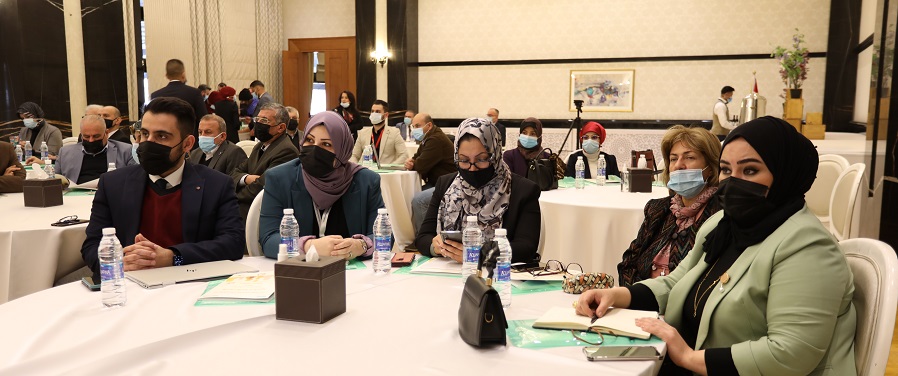
2 February 2022, Baghdad – The Ministry of Health in Iraq, together with the World Health Organization (WHO), launched the first gender-based violence strategic plan, 2022–2026, on 31 January 2022. The plan will provide the strategic vision and operational directions for better implementation and coordination of sustainable interventions related to the health system's response to gender-based violence to reduce its short- and long-term negative health consequences.
Dr Rana Mohammad Ali, Gender-Based Violence Officer for WHO Iraq, indicated that the strategic plan aims to integrate comprehensive and well-coordinated gender-based violence health services into health facilities at the primary, secondary and tertiary levels.
“The plan also intends to increase community awareness on its prevention and strives to fight stigmatization while strengthening the integration of gender-based violence services into the humanitarian and emergency health response,” she added.
The strategic plan is designed to gradually cover all provinces of Iraq, including the Kurdistan region, as a flexible and ad-hoc plan tailored to each province's specific needs and situation.
“This strategy focuses on reducing the impact of gender-based violence by ensuring adequate physical and mental care is available and accessible for all survivors,” said Dr Ahmed Zouiten, WHO Representative in Iraq. “We will need to work collectively on correcting the root causes of the violence itself and ensuring that our girls and boys are educated correctly and sensitized on the need for respect for one another.”
Gender-based violence worsens during humanitarian crises as vulnerability increases, especially when accountability decreases. The pre-existing gender and social inequalities affecting women and girls have been further exacerbated during the COVID-19 pandemic and increased different forms of gender-based violence, particularly domestic violence.
The Minster of Health H.E Dr Hani Bader Al-Aqaby cited the importance of having a strategic plan for gender-based violence as it is considered the main pillar through which we can provide curative, preventive and psychological services to survivors of gender-based violence.
“The Ministry of Health is committed to be an active part of an institutional change to approach gender-based violence prevention and response, in coordination with WHO and civil society organizations,” said H.E Dr Hani Bader Al-Aqaby.
In Iraq, some 1.32 million people are estimated to be at risk of different forms of gender-based violence and more than 75% of them are women and adolescent girls. 77% of incidents are linked to domestic violence. The recently launched WHO global violence against women report estimates a prevalence of 26% of lifetime intimate partner violence among ever-married/partnered women aged 15–49 in Iraq.
The United Nations defines violence against women as "any act of gender-based violence that results in, or is likely to result in, physical, sexual, or mental harm or suffering to women, including threats of such acts, coercion or arbitrary deprivation of liberty, whether occurring in public or in private life."
For more information, please contact:
Ms Baraa Shaba
WHO
Mobile: +9647800010244
Email:
This e-mail address is being protected from spambots. You need JavaScript enabled to view it
Ajyal Sultany
Communications Officer
This e-mail address is being protected from spambots. You need JavaScript enabled to view it
+9647740892878



